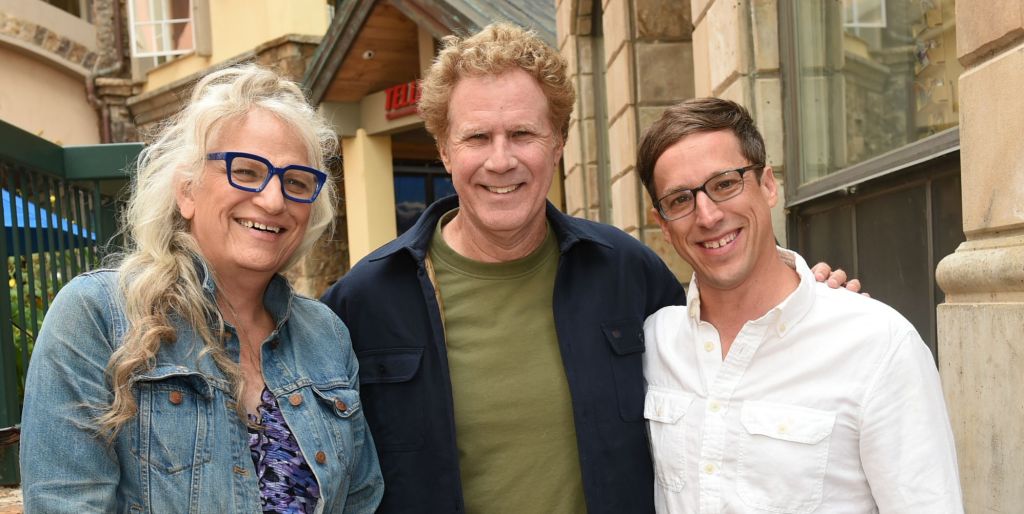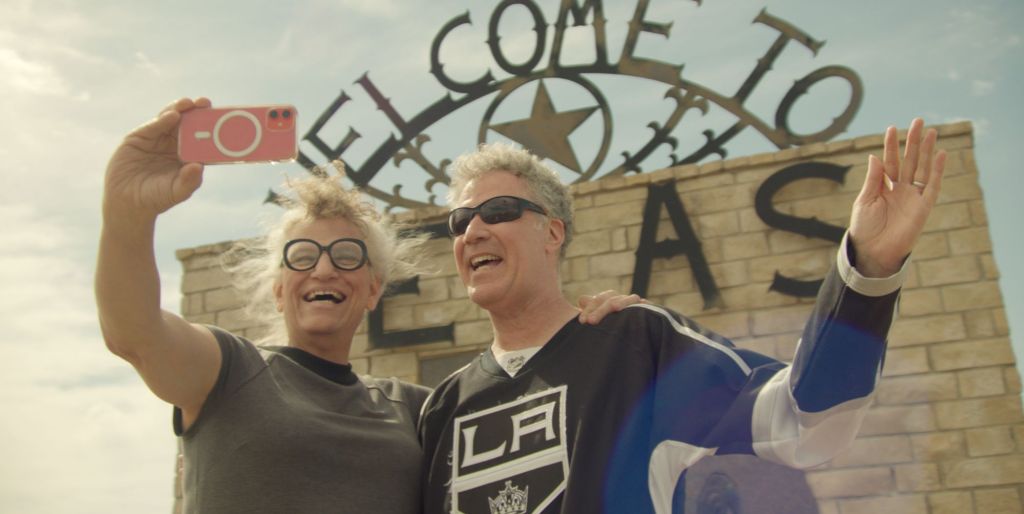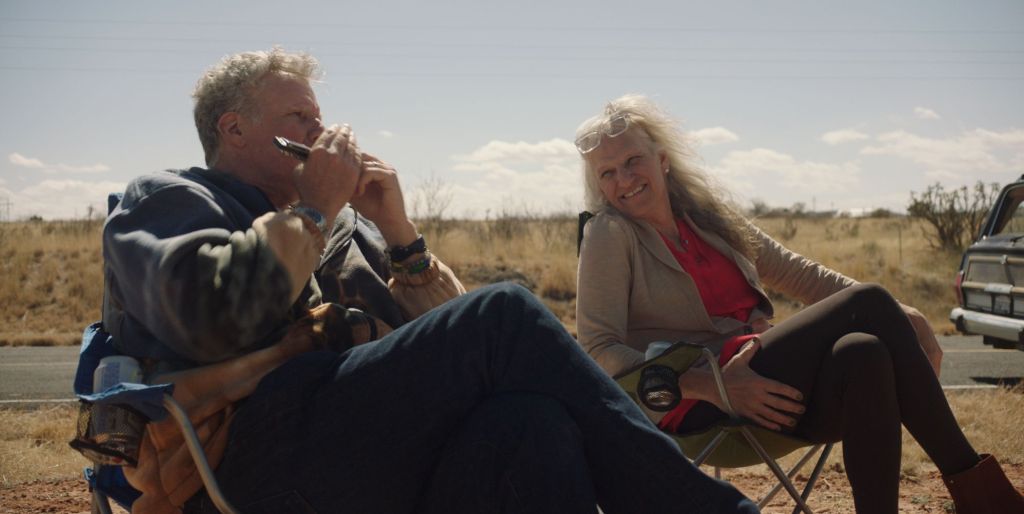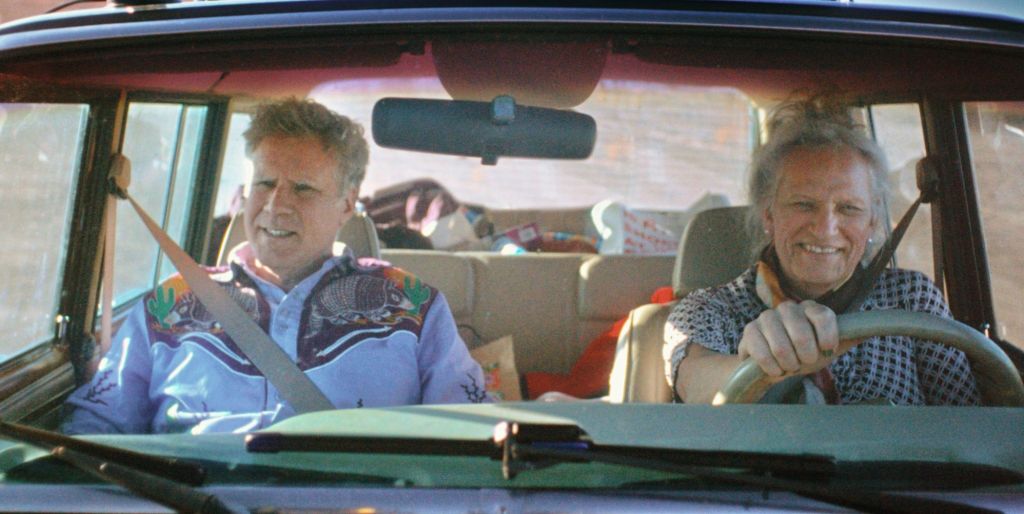Will Ferrell and Harper Steele on creating ‘joyful’ trans film Will & Harper
It’s not difficult to get an idea of what Harper Steele was like before she became Harper Steele.
In a chic hotel in London, she and best friend, Anchorman star Will Ferrell, are telling PinkNews about their evenings out in years gone by, when they worked together on US sketch show Saturday Night Live (SNL) in the 90s.
Steele was the person who would “just sit in the corner of the bar with [her] beer,” Ferrell recalls.
She smiles at the memory: she’d always be away from the bustle, trying to “stay out of the spotlight”.
Josh Greenbaum, long-time friend of both Ferrell and Steele, also remembers that.
He’s the director of their new Netflix film, Will & Harper, in which the pair head out on a road trip across the US. The reason being that after 27 years of friendship, Steele came out to Ferrell as a trans woman, by email in 2022, at the age of 61.
The trip was a way for them to reconnect and work out their new relationship dynamic, and for Steele to revisit some of the hyper-masculine places she loved as her old self – dusty dirt tracks, grungy dive bars – to see if she’d still be welcome.
“She’s someone who has spent a life avoiding being in front of people and on camera,” says Greenbaum.
Steele met Ferrell when she was a writer on SNL and he was the new kid on the block trying to be funny. According to some, he wasn’t very good at it. She whisked him under her wing and convinced the bosses to give him a chance.
After all, Steele had some sway at SNL, not that there’s much evidence to prove it. “She was there for 13 years. She was the head writer of the show [for four years] and I found [just] two photos of her,” says Greenbaum. “In most of them, she’s running out of the frame or hiding in the deep background.”
At its heart, Will & Harper is a film about the power of transformation, in the literal sense, obviously, but in other ways, too. What happens when someone with such deep-rooted fear of being themself can, finally, be themself? Is there a future that involves trans people being treated as just that, people, rather than political fodder? How might the allyship of one of Hollywood’s most famed white, cisgender funny men help change public opinion?
Ferrell can pinpoint the moment in the documentary where he saw the real Harper Steele. The pair had wound up in an Illinois karaoke bar with Dana, a 65-year-old trans woman they met in the city of Peoria. “This is basically the first time I’ve ever done this. I can’t sing,” Steele told the crowd, before Sonny and Cher’s “I Got You Babe” started to ring out.

“My friend here… what I loved about her, in her dead self in a sense, was how grumpy she was,” Ferrell says. They pause for a mischievous chuckle.
“Now we’re in this karaoke bar and she’s addressing this crowd in such an effortless way and I’d never seen that before. I’d never seen her being so front-facing as truly herself. That was a joyful moment for me, like: ‘Oh, this is who you truly are. This is incredible’.”
The trio had no planned direction for the film, other than in the literal, geographical sense. Steele was even hesitant at first, and it took numerous conversations with Greenbaum over beers to convince her it was worth doing.
At the beginning of the film, Steele reads the letter she wrote to Ferrell, lamenting the intense fear and self-doubt she feels around her transition. But, as one day’s filming slipped into the next, Steele felt the weight lift.
“Waking up knowing that I’m going to be comically battling with [Ferrell] in a fun way, that just brings me joy,” she said. “But then to wake up as Harper Steele every day and be able to do it, I didn’t do it that way for many years.”
For decades, her life was one spent in metaphorical hiding. The film allowed her to see America as she was meant to see it. “The whole thing was joyful,” she says. “It’s beautiful.”
During filming, Ferrell slips naturally into his well-trodden role as class clown, teasing that the pair haven’t done “one fun thing” on the trip, and ribbing Steele about her post-transition driving abilities. But it’s her openness and vulnerability that is “the core of the film”, Greenbaum says. “She’s so brave in so many ways, and she is the one who starts opening up the conversation for Will.”

It feels sadly ground-breaking, watching Ferrell and Steele exchange simple questions. Ferrell probes: Why the name Harper? Would she ever consider bottom surgery? In response, Steele asks: “Were you a little worried about how to talk to me when I came out?” In a world where anti-trans tabloid nonsense is taken as gospel, it’s heartening to see how much a non-judgment space to ask questions can take the thorns out of a conversation.
“We got in some deep conversations about areas that weren’t as joyful,” Steele says – they touch on her suicidal thoughts pre-transition, her insecurities – but difficult heart-to-hearts are only difficult because they matter.
Still, Greenbaum is clear. “She’s only so open because he’s a close friend. One thing she and I and Will don’t want people to take from the film is that you can just walk up to any trans person and ask them deep, probing questions.” The documentary is no excuse to interrogate random people you see on the street and believe to be trans, but it is a reminder that listening to transgender people is the best way to understand them.
There is a major case in point in the film. At a basketball game in Indiana, Ferrell and Steele cross paths with Eric Holcomb, the state governor.
Ferrell tells him that this is Steele’s first post-transition sports game, Holcomb shrugs uncomfortably. Later, the duo find out that the governor had signed a bill banning gender-affirming healthcare for minors in the state. But presented with the opportunity to actually talk to a trans person, all Holcomb could do was tightly smile.
“I think we all said we don’t want to make a political film,” Greenbaum goes on. “It’s a very intimate, personal story between two people. That said, we know it will be brought into the political sphere.”

There are a handful of other tense encounters, including at a Texas steak buffet where the pair take on what should be a silly eating challenge (Ferrell is dressed as Sherlock Holmes). The buzz of actual Will Ferrell popping into the local steak joint quickly goes stale, as customers realise he is with a trans woman.
“As much as I’ve been in a fish bowl at various times in my life, this trumps all of it,” Ferrell says, spooked. After leaving, the pair are inundated with social media posts accusing them of being groomers.
Conversely, there are moments of sweetness from those you’d least expect. In a dimly lit dive bar in Oklahoma, where the walls are adorned with pro-Trump signs and “F**k Biden” flags, Steele has some of her most innocuous conversations. “Nice to meet you, bro,” says one young punter. “Hey, not a bro though,” Steele responds. “She. Oh, sorry,” the man says.
“Any political issue that exists is about something very human, and so to put a human face and story to it, I think helps people understand it better,” Greenbaum says. “For those who don’t know a trans person, well, now they do. They know Harper and she’s an incredible, funny, warm, complicated, brilliant person.”
The film’s most poignant moment comes in its final 15 minutes. Nearing the end of their trip, the pair arrive in Trona, in California’s Mojave Desert, a desolate place where Steele bought a small home about nine years ago. “I just was looking for some place to go where I could get away from people… I just hated myself so much. I felt like a monster,” she reveals before being consoled by her pal.
Steele used the house as a sanctuary where she’d close the curtains and dress in “women’s clothes”. Now, she plans to give it away. “It’s just not the way to do it. You can’t hide, it catches up to you,” she tells Ferrell. “I don’t wanna be afraid of people any more. I get to be in the world.”

Today, she has thoughts for older, closeted trans people who might be watching Will & Harper at home, behind closed curtains. “Every journey is personal and different, but from my experience, it’s never too late. You don’t know this feeling of being present in the universe, to be whole, until it happens. I would say maybe people take it for granted,” she says, then points at her chest. “When you do this, at my age, you do not take it for granted.”
Steele’s experience of being present and whole involves drinking Natural Light beer, guzzling Pringles in Walmart parking lots, and showing off her unicycle prowess. Has Will & Harper helped do those things with greater peace, by keeping the fear and self-doubt she mentioned in her coming out letter at bay.
“Immensely,” she replies. “Transitioning is one of these things you start and people say, ‘Well, when did you come out?’ You’re kind of coming out for a while. That’s just the process. So, whether it’s the film or just me being in the world more as myself, every day is a new level of confidence.”
Will & Harper is streaming on Netflix now.
Share your thoughts! Let us know in the comments below, and remember to keep the conversation respectful.
How did this story make you feel?

